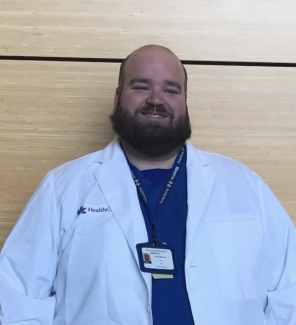
A Peek Into Eastern State Hospital's Behavioral Health COVID-19 Units
Kevin Bryant is a psychiatric nurse and is working toward a Doctor of Nursing Practice as part of the Work Learning Program, a collaboration between UK HealthCare, Eastern State Hospital (ESH), and the University of Kentucky College of Nursing (UKCON). Kevin manages three units at ESH, two of which are COVID-19 units.
Early on during the pandemic, it became clear that there was a need for COVID-19 care for patients also in need of inpatient behavioral health care. Two COVID-19 units were opened at ESH and have been managed by Kevin Bryant. "The top priority of ESH regarding COVID-19 care," notes Bryant, "is ensuring everyone is safe and provided excellent care." ESH was fortunate to have available inpatient units at the time of the COVID-19 outbreak. Two units were converted for the care of patients who were COVID-19 positive and those awaiting COVID-19 test results. Bryant revels at the teamwork exhibited by many departments in the hospital. "This did not come without difficulty," he explains. "As a behavioral health hospital, ESH was not prepared to handle a large medical crisis. Caring for COVID-19 patients at ESH is a rare situation because the patients have an existing behavioral health challenge and now the onset of an often serious medical issue. This makes for a unique patient population." For safety reasons, patients had to wear a mask and stay in their rooms. This is difficult and isolating for patients and causes boredom," he explains.
Not only were care needs unique for patients on the behavioral health COVID-19 units but also nurse manager responsibilities were unique. For example, this particular unit did not have televisions; so, ESH secured iPads for the patients. However, just as this solved one challenge, it created new challenges for staff related to patient care. As these challenges were being addressed, there were ongoing pressures to maintain adequate personal pretective equipment (PPE) for the COVID-19 units. Bryant describes the duelling needs, “The work to obtain adequate PPE for the COVID-19 unit was occurring at the same time we were caring for patients’ symptom burdens stemming from their mental health challenges." These challenges required additional staff to provide this care on the newly opened COVID-19 units.
Bryant had support from ESH administration as well as from his Work Learning Program (WLP) doctoral cohort. He notes that the WLP experience has helped him with time management related to the increased workload brought by the COVID-19 outbreak. He also learned to lean on support from others who can offer advice about various concerns. In the WLP, students meet as a large group a few times throughout the semester; but outside of those events, students in the program communicate frequently throughout the week. For Kevin, the WLP created a sounding board for advice and led to sharing of time management ideas which he implemented. Bryant looks pensively, then says, "Both the sounding board and idea generation have been key factors to my success in setting up and managing the ESH COVID-19 unit."
Through the WLP, Kevin has also garnered a greater appreciation for the individuals that he leads. Kevin shares, “Maybe I’m a little biased, but I’ve always appreciated those I manage and those who choose to follow my lead. Being in this program has further heightened that appreciation. It’s helped with different strategies for handling different situations and interactions with staff of varying personalities.”
Hats off to Kevin Bryant and his teammates at ESH as well as to the WLP doctoral cohort for being creative and making sure that patients have access to quality behavioral health and COVID-19 care.
